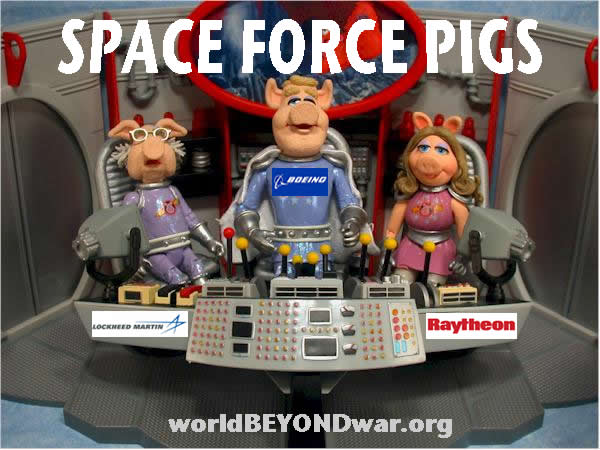One cannot help but appreciate the speed with which it became acceptable to produce comedy about the U.S. Space Force. I don’t think any military branch or war or weapon or coup or base or boondoggle has been taken off its holy pedestal more rapidly. Recent clownish yet endearingly murderous efforts to overthrow the government of Venezuela are unlikely to be mocked in a movie for decades to come. But — as with most Hollywood productions — the new Netflix comedy about the Space Force has a set of predictable shortcomings.
I’ve watched one episode, so feel free to tell me if later episodes vary from what I’ve seen. Episode one is occasionally vaguely funny. It makes fun of Trump, which is always good. It makes fun of the Joint Chiefs of Staff, which is much to be applauded. It mocks military recruitment efforts, which is fantastic. It even highlights the outrageous financial cost of all things military, and compares them to the cost of schools — which is worth a standing ovation. But I have a few complaints.
- While Space Force the show probably overstates the cost of launching a satellite, it does not touch on the full cost of U.S. militarism, which is over $1 trillion a year, a tiny fraction of which could radically transform life for people around the world.
- The dimwitted general who leads the Space Force is depicted as being motivated by pettiness and stupidity but also by a simple desire to succeed at whatever he’s ordered to do. He is not, however, depicted as the sort of kiss-up, suck-up, groveling, corporate-profit-serving weasel most top members of the U.S. military seem to be in reality.
- Where are the corporations? Where is the weapons promotion? Where are the public-private partnerships? Where is the scheming to enlarge budgets and profits, not just the reckless launching of a satellite to maintain current budgets? The actual Space Force was a long-time dream of weapons lobbyists, as a means of making more money for themselves, not just the product of a nitwit general who’d like his branch of the military to be as big as somebody else’s.
- It should go without saying by now, but this show, like most U.S. cultural products, pushes Russiagate nonsense. Space Force, the fictional version, depicts Trump as facilitating a Russian spy’s work within the Space Force. At the same time, the show mocks paranoia about potential spying by China.
- Yet episode one ends with what is reportedly a Chinese satellite attacking a U.S. satellite. The bipartisan need to generate imaginary enemies, in the end, outweighs the partisan drive to blame things on Russia and mock blaming them on China. The reality, missing entirely from the Netflix Space Force, is that Russia and China and the nations of the world have been trying for many years to ban weapons from space, while one government has been opposing such efforts and pushing space weaponization with no enemy-based justification to be found but much profit to be made.
- The U.S. military, including the Space Force, doesn’t exist to create jobs, muddle bureaucracies along, launch satellites, spend money, and engage in office scandals and rivalries. It exists to murder large numbers of people and destroy huge areas of the earth. There’s not the vaguest hint anywhere in this show of what the U.S. military does. Nobody mentions that the satellites are for targeting weapons. Nobody suggest what weapons do to men or women or children. There’s not a drop of blood or an ounce of suffering. Of course, war isn’t actually funny, but if you read promotional materials about this show, and even reviews of it, the whole marketing concept is that Space Force combines humor with earnestness. Just not enough earnestness to include death, I guess.


